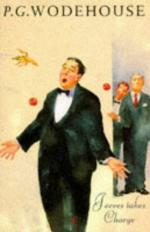|
This section contains 5,074 words (approx. 13 pages at 400 words per page) |

|
Friedrich Nietzsche's concept of the superman— a self-created hero and a natural leader— influenced a number of British writers during the early twentieth century, most notably D. H. Lawrence and George Bernard Shaw. In the following essay, Spath argues that Jeeves represents one of the best examples of the superman in popular literature.
There can hardly be any doubt that the most intriguing character created by P. G. Wodehouse is that of butler Jeeves, even though, as the clever servant who, episode after episode, proves superior to his master, he is anything but original. From the viewpoint of literary history he is indeed of as ancient a family as that hopelessly inefficient rich young man whom he serves. The extraordinary fascination Jeeves has held for a vast number of readers invites some investigation of how his author made use of one of the stock figures...
|
This section contains 5,074 words (approx. 13 pages at 400 words per page) |

|




